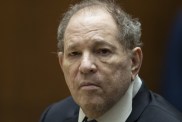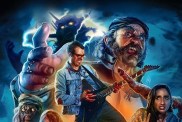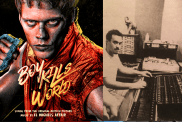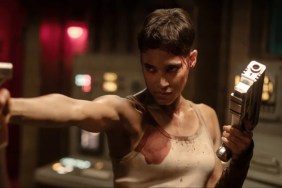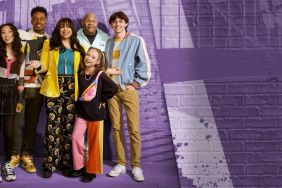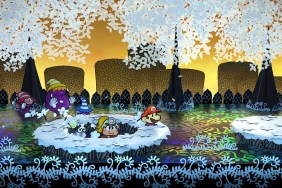Showing no signs of slowing down after turning 80 earlier this year, filmmaker Clint Eastwood held the attention of a room full of journalists at the New York Film Festival press conference for Hereafter over the weekend, hours before the drama closed the 48th annual fest. Screenwriter Peter Morgan and actors Matt Damon, Bryce Dallas Howard and Cecile de France were also in attendance.
The movie is made up of three concurrent storylines, one featuring Damon’s George Lonegan, a psychic who can communicate with dead loved ones who is trying to have a normal life, de France as a French journalist who survived a near-death experience and is looking for answers on what she saw before returning to life, and two London twins who are separated by death, causing the living twin to find a way to reconnect with his dead brother.
Below are some of the highlights of that press conference:
How the project came together:
Peter Morgan: I wrote this on a mountain and it played unlike anything else I’d ever written. It was the least schematic thing that I’d ever done. I had read a book about a woman in her mid-30s who lost her younger sister to cancer, and I found the book incredibly moving, and she didn’t want to give up any idea that she might be able to connect to her dead sister. I should say that she, as well as I, come from a tradition of irreligious enlightenment and I don’t have any religious beliefs of an afterlife. We have so much understanding about what goes on prior to birth and we have so little understanding of what goes on after death, and this woman used a journalistic investigation to try and see if she could connect to her sister. She just didn’t want to give up. I was very moved by this, so moved by it that I thought I’d like to do something like this, but I don’t know in which area. I wrote the script and then sometime later, I changed agents. The script, because of one thing or another, had just been in my drawer. Because there were three stories and it was somewhat unconventional, I knew I wanted some feedback, so I gave this new agent the script and said, “What do you think?,” and they gave it to (producer) Kathy Kennedy and I kept waiting for the notes, and Kathy Kennedy gave it to Steven Spielberg, and this started getting more and more ridiculous. Then Steven Spielberg asked me to fly out so he said, “Would you mind if I gave it to my friend Clint Eastwood?” Prior to that I should say–and I hope he doesn’t hate me for this–but I’m in the boardroom at DreamWorks and the assistant walked in and said, “Mr. Spielberg is taken to having his meetings in the dark,” so all the lights were turned low, and this distinctive voice said, “Would you mind if I showed this to my friend Clint Eastwood?” And I thought, “This is the most surreal meeting I’ve been to in my life.” So that’s how we find ourselves here today.
Clint Eastwood: Steven Spielberg called me one day and said “I have a script that I’d love to send over to you” and I said, “Fine, send it over.” He and I had worked together on a few other projects and I read it and I liked it, so I just called him back and said, “I’ll do it.” I didn’t realize I was last on the list, however he was going through a minor divorce with Paramount Pictures so it became a little confusing to where this would have its life, but I have a relationship with Warners and I said, “Let me take it to Warners.” They liked it so there we were. I liked the script immediately. There were a few little ideas I had but I just put those in the back of my head. I thought it was good the way it was and didn’t need rewrites and I haven’t shot a picture when they had blue pages in it in a long time. Either you like them or you don’t, but I liked this one. Most religions seem to ponder the afterlife, but I thought it was interesting because it wasn’t really a religious project. It had a spirituality about it, but it wasn’t necessarily tied in with any particular organized thought. I think, whether you believe in the afterlife, or the chance of this near-death experience, you come back and see semblance of it. Whether that’s happened or not, I don’t know, but I think certainly everyone has thought about it at some point or another in time and it’s a fantasy that if there is anything out there like that, it would be just terrific, but that remains to be seen.
On researching the material and preparation:
Morgan: In terms of the research, I kept meaning to get around to that, and then I remembered when I wrote “The Queen,” as soon as you typed in the words “Princess Diana,” death” and “conspiracy” into the internet, it’s a very short step to UFOs and dolphins and stuff. I did try a little bit and what I found out there is quite frightening. If you type some of these questions into the internet and think, “Let’s see what’s been done on this,” you’re very quickly in a community of strange people. And so, I kept thinking, “Oh, we’ll get around to that,” and I did send a couple of Emails to a couple of people who I thought would be interesting, and one in particular, and he was just unwilling to meet. He was a physicist that I thought had done some stuff. I’d never experienced that before. Then later, I thought, “I don’t want this film to become a film in which we have the answer and we’ve got a scoop here, and guess what? This happens.” Because that’s not what the film is. The film is really a story of inquiring, of curiosity, and a feeling of incompleteness, and a feeling of living with mystery, and it’s something that unites every one of us other than the act of being born. None of us knows where we’re going and no one has any idea and we’re going to be rewarded alone.

Eastwood: [The movie] raises a lot of questions but it’s just like Peter Morgan was saying that the questions, that’s where it ends. You pose the questions and it’s up to the audience to meet you halfway and think about it in terms of their own lives; what their thoughts are or what experiences they might have had. There may be some near-death experiences out there and it would be interesting to see what the answers were, but they are going to have to come up with all the answers. As far as the technical thing, like doing the tsunami, I took all the amateur footage shot on that particular tsunami when it was happening, we took that and used it as our influences to get going, but everything else has to be in the imagination of the performer. I know everybody has a way of preparing. I just allow everybody to do that on their own and then if something isn’t working then [that’s] another thing. If you have people that do that inner research, they bring that to the table. I’m a firm believer in research, but I’m also a firm believer in utilizing the instincts that are within you, wherever they reside.
Matt Damon: It was just a terrific script too, it was really tight. It read like a play in a sense that sometimes when you do a play, you don’t have to do anything. You explore the material and every answer you need is there. I’m somebody that does a lot of research normally on my own and as Peter said, I didn’t want to go down the rabbit hole. If somebody was recommended to me, then I would have gone and spoken to him, but nobody like that came up; it was all really all on the page in terms on getting ready. I had to do some forklift training that was about it.
Creating the Tsunami:
Eastwood: I thought an unusual aspect of the script was taking actual events and placing them into a fictional story and so the tsunami of four years ago out in the Pacific was one and then the London bombings of course, but I thought that was a unique thing to do, but the tsunami was very difficult to do. I kept having fantasies of huge hoses and thousands of gallons of water running down the streets and I figured out how to do that. I figured that would be prohibitive, “Where would we do that?” In the old days, I suppose you would have done that on a set and you’d done little set pieces and then turned the water loose, but with computer-generated elements, you can go ahead and do it, even though water is probably the most difficult thing to do in a CGI basis, I have a fellow named Michael Owens who worked with me on “Letters From Iwo Jima” and “Flags of Our Fathers” and back as far as “Space Cowboys” so he kept very much hip on the technology as it had been improving over the years, and we went through it and figured out what shots we would need to do live and we did it. But it took a lot of different places. Cecile was in a tank in London for nine hours without getting out too much and she had to have a skin replacement afterwards, but then we went to Maui and shot in the ocean and in the streets of Lahaina. We had to pre-plan it to piece all the elements together with the connective shots and what have you. If you don’t pre-plan CGI, it’s the most expensive thing in the world so you have to plan every single shot and that’s normally not the way I shoot, but in this thing, it worked out rather well.
On the young actors playing the twins:
Damon: [Clint] cast them and I remember talking to him during the process. I think we were pretty resigned to the reality that we’d probably have non-actors, because obviously you are looking for an 11 or 12-year old kid, so you are not going to find like a Julliard graduate. Clint just loved their faces. I remember talking to him and saying, “You know the faces of these boys are terrific. They seem to be from the same neighborhood and they are non-actors.”
Eastwood: The interesting thing with child actors is kids are natural actors, they are wonderful actors and most kids are acting all the time. They are out in the yard playing and they are imagining and can get very vivid. Unfortunately, once they’ve been organized into acting and somebody says: “Come on, no, do it this way” – and I’ve watched many times over the years in other films where a director will try to undo a lot of bad habits that have been instilled. When I looked at young kids for this picture I took the two that were the least experienced; in fact they had to have no experience, they’d never been on a film before, they said they had been in some grammar school plays but I doubted that. I’m one of those guys that if you cast a film correctly that’s with professionals or amateurs you are probably 40% there. If you’ve cast a film incorrectly you are going to be fighting an uphill battle, but these kids I just figured I could pull things out of them without them knowing it, better than trying to get somebody organized. [We] auditioned about three or four sets of identical twins, they looked great, but there was a lot of acting going on and I said, “These guys have the right face and their accents are from the right neighborhood.” They had certain aspects that these kids needed to have built into their system so we didn’t have to do anything; they didn’t have to get in there and act like something else that they weren’t.
Damon: They shot the first 2 stories without me, so I would kind of get reports on how the boys were doing, but when it came down to the scene we did together, there’s a lot made of the few takes Clint does, but he does the number of takes that are required. We both went in that day going, “We are really going to have to get this from these guys” and one really smart thing that Clint did was that he interchanged the twins, even if he was only going to use one of them, he let them both do the scenes. I think that took a lot of pressure off both the boys, and for that scene, it allowed us to play them off one another, I would get one of them aside and get all of this information, like did his brother have a girlfriend or little things like “Whose farts were the stinkiest?” things that they would think were funny. Then while the camera was on them, Clint and I would ask them to reveal these things so that we got real reactions out of them and just little tricks like that just to help them, because movie sets can get tense and people can get nervous pretty easily. Never on his sets, but that’s all by design, and he kind of created an environment where those kids wouldn’t know that they really shot a movie. I think they had a really good time, they’ll probably be surprised when they see the movie.

Recurring themes and retaining relevance as a filmmaker:
Eastwood: I like to think there are different themes in every film. I don’t know if there’s an ongoing theme. I think everything to me is spontaneous. “Unforgiven” is an example of a script I liked right away. I said, “This is great, but I’d like to do this when I’m older,” so I stuck it in the drawer for 10 years and then took it out. Other projects have just come to me like “A Perfect World.” Some are just whatever. They just sort of fall, and I have no real rhyme or reason. I wish I could give you some sort of pseudo-intellectual thing. If this was a French cinema class I’d have to fake something. I’m not really the person to ask on that. If I start evaluating myself, I would be afraid to not be able to think intelligibly of every project at various meetings.
Damon: I actually asked a similar question of him on “Invictus” about directors as they got older: “Why was it that they historically seem to fall off?” I remember asking him because he’s obviously completely avoided that. He thought about it for ten seconds and then said, “I don’t know. It doesn’t make sense to me.” It never did to me either, because presumably the older we get the wiser we get, the more knowledge about filmmaking, the more different kind of films you’ve made. You know this one had stuff (like) that whole CGI thing. He kind of just plowed into it with utter confidence and that sequence is incredible. So it is kind of mystifying to me that historically the great directors–not all of them but many of them–kind of fell off as they got older, and it never really made sense to me.
Eastwood: I was always shocked. I knew Frank Capra a little bit and I spent some time with him at Cayuga Lake, where he lived in the summer time and he was always so bright. I just always thought: “Why isn’t this guy working?” I also knew Billy Wilder somewhat and he had actually stopped working in his sixties, and I thought, “God, that’s amazing. Here’s a guy who’s bright and lived well into his 90’s and didn’t work.” I figure your best years should be at a point when you’ve absorbed all this knowledge. Now maybe they just didn’t keep up with the times or they picked stories that didn’t work. I have a few pictures that don’t do so well, and all of a sudden, people are very fickle and things in Hollywood are very fickle and they kind of move on. There is a [Portuguese] director who is still making films at over 100 years old, and I plan to do the same thing.
Hereafter opens in New York, L.A. and Toronto on Friday and then nationwide on October 22. Look for our own exclusive interview with Peter Morgan sometime next week.
